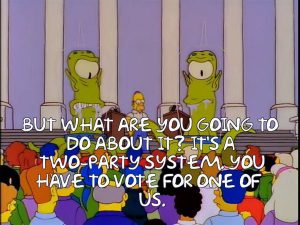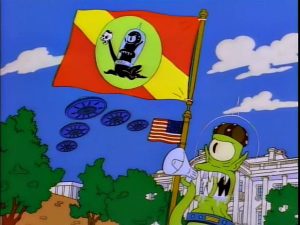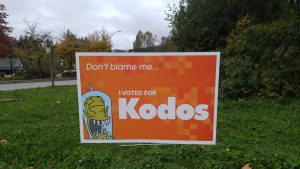One of the most poignant statements about our political system in the west was the election speeches of  Kang and Kodos as Bob Dole and Bill Clinton running for president in a Simpsons episode from twenty years ago. When Homer unmasks the aliens in human suits whose bland campaign promises are less rioting and more failure, they merely shrug: “It’s a two party system. You have to vote for one of us.”
Kang and Kodos as Bob Dole and Bill Clinton running for president in a Simpsons episode from twenty years ago. When Homer unmasks the aliens in human suits whose bland campaign promises are less rioting and more failure, they merely shrug: “It’s a two party system. You have to vote for one of us.”
This notion is so widespread in the American ethos that it has also begun to infect Canadian politics. The “reasoning” goes like this. I want my candidate to win. My candidate can’t win according to the polls. I will not vote for someone who might lose. Therefore, I won’t vote for my candidate. Therefore I must vote for someone who I do not support in order to have a winning candidate. Yay, a candidate whose platform I did not agree with won because I voted for them. That means I won. Me. I’m a winner.
Although this may seem excessively simplistic way of configuring what some might claim is a complex dynamic, it captures the essentials of the argument. Once in conversation with a very knowing American of my acquaintance, to paraphrase Jonathan Swift, I was told that my analogy lampooning so-called “strategic voting” was unfair. I had suggested that voting for someone whose platform you disagree with merely so you will win your miniscule part of the election process is anti-democratic. I said it was similar to choosing either Hitler and Mussolini because Ralph Nader might not win the election. He told me the analogy didn’t work because the candidates are never as bad as Hitler and Mussolini. There is always one candidate who is better than the other. For him, that made “making your vote count” worthwhile.
Although we might think that unscrupulous  Machiavellis like Kang and Kodos are behind the promulgation of this mentality, we need only look at what we hope to accomplish in the election to discern its origin. The objective of voting in a political system is not actually the same as in blackjack. We are not voting merely to win the fifty dollars. The payoff is potentially much more significant and possibly even more frightening than that. Many voters approach the system with their ego firmly planted on their sleeve, however. For them, the contest between their chosen candidates is like that of their favourite sports teams. They are a Patriots fan and that means they will cheer for their team come whatever may. Their vote is not meant to support a particular political platform from one of the candidates. It is meant to support the person, and more importantly indicate that the voter makes good—which means accurate—choices.
Machiavellis like Kang and Kodos are behind the promulgation of this mentality, we need only look at what we hope to accomplish in the election to discern its origin. The objective of voting in a political system is not actually the same as in blackjack. We are not voting merely to win the fifty dollars. The payoff is potentially much more significant and possibly even more frightening than that. Many voters approach the system with their ego firmly planted on their sleeve, however. For them, the contest between their chosen candidates is like that of their favourite sports teams. They are a Patriots fan and that means they will cheer for their team come whatever may. Their vote is not meant to support a particular political platform from one of the candidates. It is meant to support the person, and more importantly indicate that the voter makes good—which means accurate—choices.
For such a voter, the choice between Hitler and Mussolini is not one that is fraught with angst. They already know they are going to vote for the most popular candidates, they merely need the thinnest of reasons to pick one over the other. Since the two are practically indistinguishable during the election season, this becomes difficult, as well as blandly easy.
So see how this mentality works, we may want to look more closely at the Simpson’s presentation of elections.
In season two of the Simpsons, episode four (“Two Cars in Every Garage and Three Eyes on Every Fish“) the more worthy candidate, Mary Bailey, claims that she is going to rely on voter intelligence: “My worthy opponent seems to think that the voters of this state are gullible fools. I, however, prefer to rely on their intelligence and good judgment.”
The Political Reporter is not overly optimistic. “Interesting strategy. Good luck.”
This cynicism about the voter is even more prevalent in the Kang and Kodos election episode (“Treehouse of Horror VII” season eight), which aired, appropriately enough, on Halloween in 1996, and expresses how the voter might be boxed into their own mentality:
Kent Brockman: Kent Brockman here with Campaign ’96, America flips a coin! At an appearance this morning, President Clinton made some rather cryptic remarks which aides attributed to an overly tight necktie.
Kodos: I am Clin-ton. As overlord, all will knee trembling before me and obey my brutal commands! End communication.
Kent Brockman: Senator Dole, why should people vote for you instead of President Clinton?
Kang: (as Dole) It makes no difference which one of us you vote for. Either way, your planet is doomed. DOOMED!
Kent Brockman: Well, a refreshingly frank response there from Senator Bob Dole.
While at a rally, Kang suggests his shifting platform, much to the delight of the crowd:
Kang: (as Bob Dole) Abortions for all!
(Crowd boos)
Kang: Very well, no abortions for anyone!
(Crowd boos again)
Kang: Hmm… Abortions for some, miniature American flags for others!
(Crowd cheers and waves miniature flags.)
Exposing finally their meaningless platforms, both Kang and Kodos throw caution to the winds:
Kang: The politics of failure have failed, we need to make them work again. Tomorrow, when you are sealed in the voting cubicle, vote for me, Senator Ka-, Bob Dole!
Kodos: I am looking forward to an orderly election tomorrow, which will eliminate the need for a violent blood bath.
Reflecting on their success, Kang suggests that “Fooling these Earth voters is easier than expected.” Kodos, playing Clinton, says, “Yes. All they want to hear are bland pleasantries embellished by an occasional saxophone solo or infant kiss.”
When Homer exposes that their candidates are aliens, the voters are still uncertain, but the candidates know their success is written into the electoral system:
Kodos: “It’s true, we are aliens, but what are you going to do about it? It’s a two party system, you have to vote for one of us.”
Disgruntled, the voter’s agreement is summed up by someone saying, “He’s right, this is a two-party system.” A man in the crowds declares that he is going to “vote for a third party candidate” but Kang merely asserts what everyone in the crowd has already decided: “Go ahead, throw your vote away!”
Once Kodos wins, he declares that “We must go forward, not backward. Upward, not forward. And always twirling, twirling, twirling towards freedom.” His bland assertion is exactly when the voters wanted to hear, and they all cheer as the planet is enslaved to make weapons to shoot a place they know nothing about.
I don’t pretend that a television show from the nineties can tell us everything we need to know about voting, but I would caution that we pause and think about what we really want to accomplish when marking our ballot. If we strip our own ego out of the equation, in which it doesn’t not affect our sense of self if the candidate we choose loses, then we might see that we should be voting for one who politics we agree with. This does not pretend to take on the concerns with voter access to information that plagued the latest American election, but if we vote about winning then we may win the Kang and Kodos we deserve.  As Homer says, “Don’t Blame Me, I Voted For Kodos,” but that is small comfort when the two candidates we are prepared to vote for are both alienated from our concerns and safety.
As Homer says, “Don’t Blame Me, I Voted For Kodos,” but that is small comfort when the two candidates we are prepared to vote for are both alienated from our concerns and safety.
